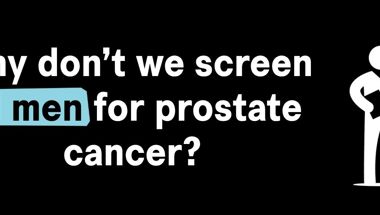Prostate cancer screening: your questions answered
This year could be a crucial turning point on our path to prostate cancer screening. But what does it all mean for men? Here we tackle some of the big questions on screening and early diagnosis.
Prostate cancer is the most common cancer in men. In fact, 1 in 8 of our dads, brothers, grandads and mates will get it.
But it’s not just about how many men are diagnosed with the disease. It’s about when they find out.
That’s because prostate cancer is much easier to treat if you find it early, before it’s spread to other parts of the body.
Right now, there are far too many men who are being diagnosed at a later stage – when it’s already too late for a cure. And that’s why a national screening programme is so important.
Today prostate cancer is the only major cancer without a screening programme. But after years of research and campaigning, we’re now closer than ever before.
So what does all this mean for men? We’ve answered some of the big questions around prostate cancer screening, including:
- Why is early detection of prostate cancer so important?
- Who will be invited for prostate cancer screening?
- How soon could there be a prostate cancer screening programme? And more.
Why is early detection of prostate cancer so important?
When it comes to prostate cancer, getting an early diagnosis is crucial. Because when you find it early, it’s much easier to treat.
Right now, it’s up to men to know their own risk and ask their GP for a PSA blood test to check for early warning signs.
But men with prostate cancer don’t usually have symptoms in the early stages – and it means there are far too many men being diagnosed when it’s already too late for a cure. In fact, only half of prostate cancers are caught in the early stages, falling short of the NHS target of 75 per cent.
That’s why a screening programme is so important. It’s a way of checking men to find cancer early, before symptoms show up.
Screening would make sure men at risk of prostate cancer are invited for routine tests, giving them a much better chance of a potentially lifesaving early diagnosis.
Why is there no screening programme for prostate cancer?
In the past, methods for diagnosing prostate cancer were unreliable and often led to men having unnecessary tests and treatments that could be harmful or cause serious side effects. That’s why there’s never been a routine screening programme before.
But today, things are different. Alongside thousands of dedicated scientists and supporters, we’ve driven forward major improvements in the way we diagnose prostate cancer, making testing safer and more accurate than ever before – and effectively curbing the potential harms.
The UK National Screening Committee is reviewing the latest evidence right now. And later this year, the committee is expected to decide if the balance has finally tipped in favour of having a screening programme for prostate cancer.
Who will be invited for prostate cancer screening?
The UK National Screening Committee is reviewing the latest evidence for prostate cancer screening. And later this year, they’ll decide if the time has finally come for a screening programme.
We’ve made our case to the committee that huge strides forward in testing could have tipped the balance in favour of having a screening programme for men at highest risk of the disease.
A targeted screening programme for these high-risk men – including Black men and men with a family history of prostate cancer – would be a big step in the right direction, saving hundreds of lives every year.
But we’re striving for a world where no man dies of prostate cancer, and we won’t stop until every man is invited for routine screening. That’s why we’re funding our groundbreaking prostate cancer screening trial, TRANSFORM, which will provide the crucial evidence that will lead the way to a safe and accurate screening programme for all men.
How soon could there be a prostate cancer screening programme?
We don’t know exactly when a decision on screening will be made. However, the Government has committed to having a public consultation on the UK National Screening Committee’s decision before the end of 2025.
Want to learn more about the committee’s prostate cancer screening recommendations? Watch our video below.
While we wait for news about prostate cancer screening, what should I do?
If you’re concerned about prostate cancer, the best thing you can do right now is to know your risk. And it’s quick and easy to do – in fact, it only takes 30 seconds to check your risk using our simple online Risk Checker.
If you’re over 45 and at higher risk of prostate cancer – because you’re Black or because you have a family history of the disease – it’s also a good idea to talk to your GP about the pros and cons of having a PSA blood test to check for early warning signs. There are advantages and disadvantages to having a PSA blood test, and your GP will be able to discuss these with you – so you can choose what’s right for you.
You can also use our Risk Information Service to learn more about your risk of prostate cancer and what to do next.
Want to follow the latest news on prostate cancer screening?
Today, we’re closer to a screening programme than ever before. And this year could be the crucial turning point. Sign up to receive our weekly emails to get the latest news on screening, plus updates on our research, campaigns and ways to get involved.




